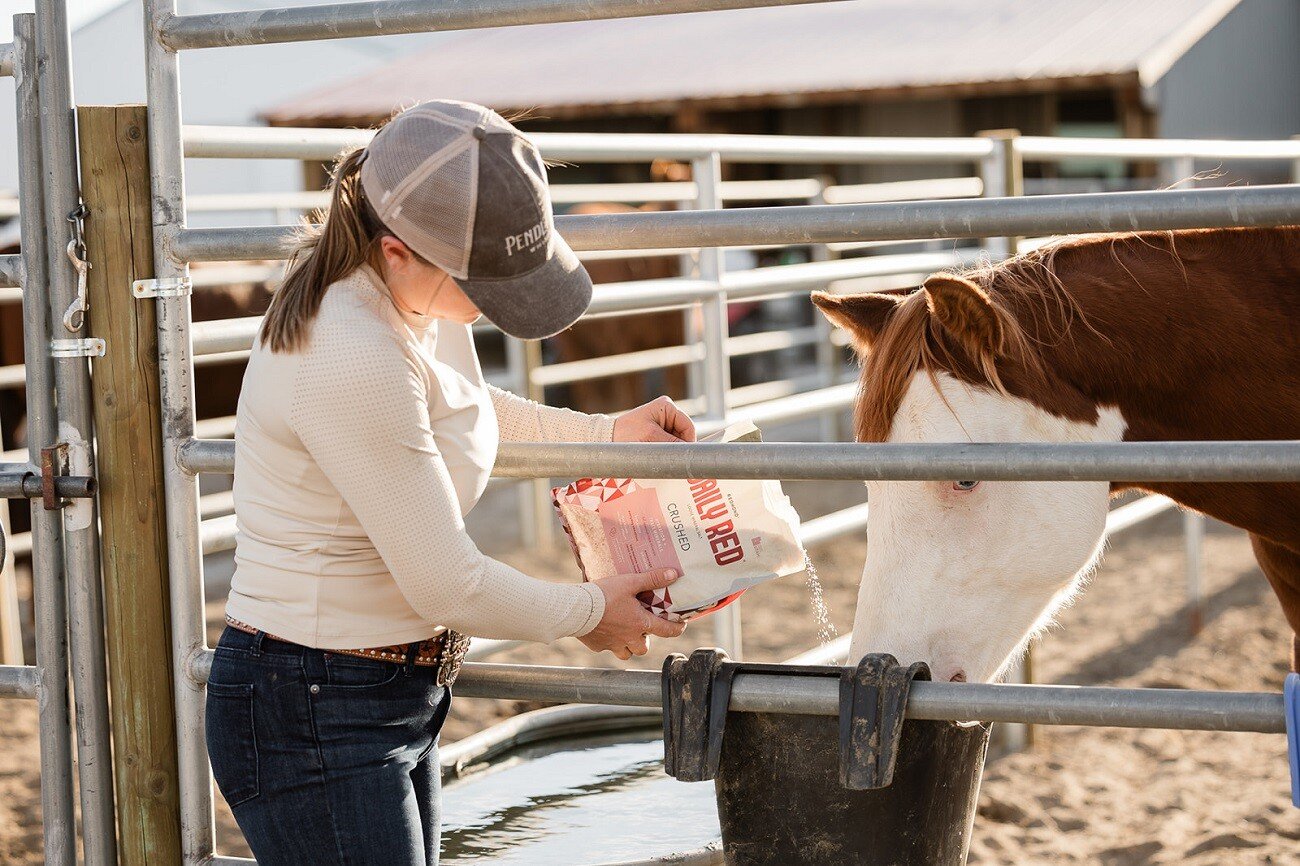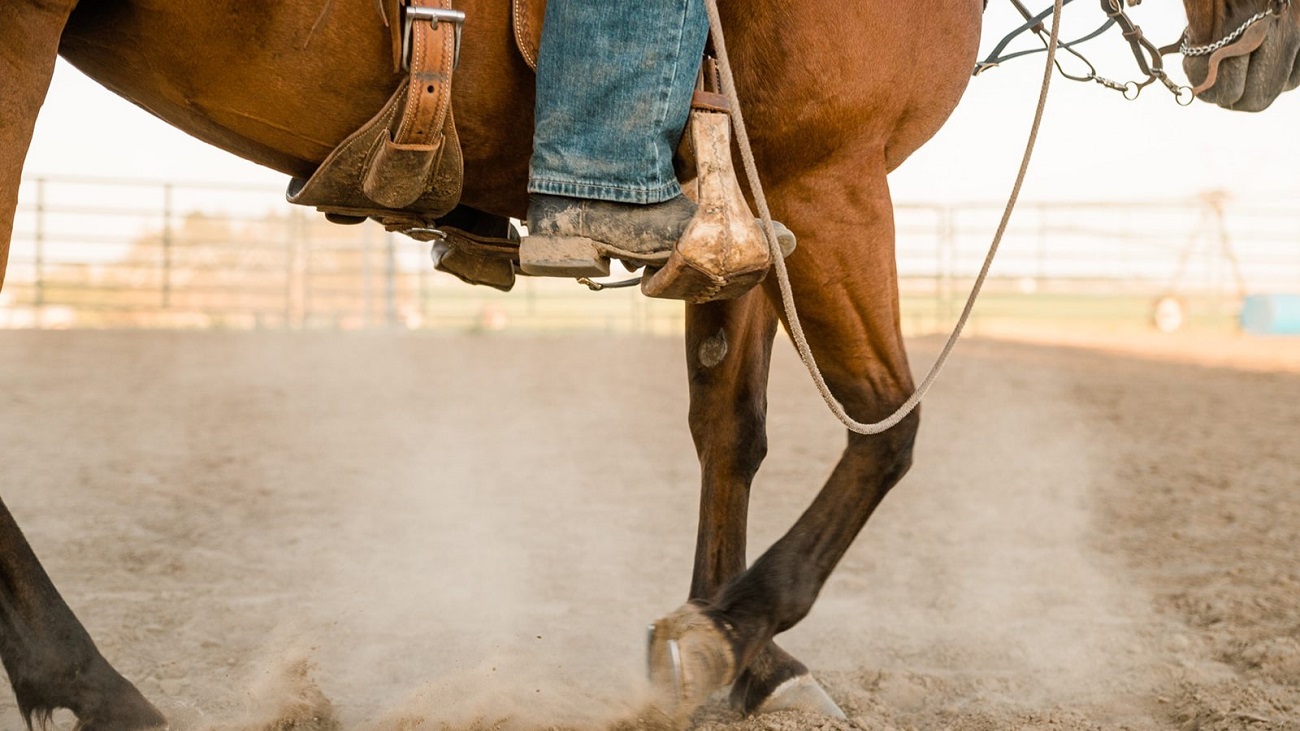Salt vs. Electrolytes for Horses: When to Feed Each and Why
July 01, 2025
Complete Guide to Feeding Electrolytes for Horses or Salt
When humidity soars and temperatures climb, you know it's time to reach for electrolytes—especially if you're on the trail or in the paddock sweating in the summer heat.
But what about your horse? You probably know salt is essential for health and hydration—but do horses need an electrolyte as well? Is salt the same thing?
Here’s the short answer: salt is an electrolyte, but it’s not the only one your horse needs. Confused? Let’s clear the cloudy waters.
Below, we cover the difference between salt and an electrolyte supplement, when to feed each, and how to pick the best electrolyte to keep your horse feeling and performing its best.
What Are Equine Electrolytes?
Electrolytes are minerals that carry an electrical charge when dissolved in body fluids. They’ve been compared to several familiar things: a steady current keeping the lights on, motor oil helping an engine run smoothly, and even crossing guards. Let's explain.
Electrolytes help regulate chemical reactions, keep digestion, nerves, and muscles—including the heart—firing properly, and maintain fluid balance in cells. And fluid is what most of us think of when we hear “electrolytes.”
Together, water and electrolytes make a great hydration team. As H2O enters the body, electrolytes direct traffic and send water to cells and organs that need it most. Like crossing guards!
In short, electrolytes help your horse stay hydrated and energized, keeping performance levels high.
What Electrolytes Do Horses Need?

You've probably spent a long day in the saddle then downed a sports drink to pick up your energy and ward off a headache.
The main electrolytes in those drinks are the same horses need—just formulated differently. Here are the key equine electrolytes, in order of importance:
- Sodium (Na)
- Chloride (Cl)
- Potassium (K)
- Magnesium (Mg)
- Calcium (Ca)
All five are important, but salt (sodium and chloride) is needed in the greatest quantity.
Signs of Electrolyte Imbalance in Horses
Every horse sweats—and within that sweat are large amounts of electrolytes. A hard-working horse can lose up to 4 gallons of sweat—and about 30 teaspoons of salt—every hour. That's a lot of minerals to replace!
But your horse doesn't have to be lathered up to lose critical electrolytes. Any prolonged sweating—during any season—or bouts of loose manure/diarrhea can also quickly deplete these vital minerals to dangerous levels.
Watch for these common signs of electrolyte deficiency in horses:
- Fatigue
- Poor performance
- Reduced sweating
- Decreased drinking
- Decreased eating
- Muscle tremors
- Tying up
Because electrolytes can’t be stored in the body, they must be replenished to help horses rehydrate and recover. That’s where salt and electrolyte supplements come in.
When to Give a Horse Electrolytes vs. Salt
Let’s say your horse has sweated hard on the trail. Or maybe he's just hanging out in the pasture when the first sweltering spring day hits. Or she's been hauling for two days.
You suspect your horse needs extra fluids and mineral replacement, but should you offer salt, an electrolyte, or both? Good question.
Horses need salt every day and added electrolyte supplements on occasion. Let’s look more closely at when to feed salt, when to add electrolytes, and how each helps your horse stay hydrated and healthy.

Feeding Salt to Horses
Salt plays a crucial role in hydration because it triggers the thirst response that tells horses to drink.
A horse’s brain monitors sodium levels and suppresses thirst when levels are too low. This helps avoid flushing more sodium from the body through excess water consumption. When sodium levels are good, thirst is triggered, and horses are more likely to drink regularly and stay hydrated.
Salt is an essential part of a horse’s everyday diet. Support daily intake and consistent water consumption by top-dressing a loose mineral salt on feed and offering a quality free-choice mineral salt lick. Get daily salt intake recommendations for horses here.
Feeding Electrolytes to Horses
Electrolytes are essential minerals that support fluid retention, muscle function, and many other critical bodily functions. Supplements come in paste, powder, and water-soluble forms.
Paste is great for quick, accurate dosing—especially during travel or before and after workouts. Powders work well when added to feed or water, but it’s harder to track how much your horse actually consumes.
Here are other guidelines from Iowa State University for safely feeding electrolytes:
- Feed electrolytes according to the amount of work your horse performs.
- Start feeding electrolytes during training, not just on the day of competition.
- Electrolytes make a horse thirsty, so always ensure clean, fresh water is available.
- Always provide a salt lick to allow your horse access to additional salt.
- Never add electrolytes to your horse’s only water supply; provide a separate fresh water source.
When to Give Electrolytes
Dr. Jessica Huntington, a veterinarian in Stephenville, Texas, notes that electrolytes are helpful anytime a horse sweats heavily or frequently, and in situations where hydration or recovery is at risk. Here are eight scenarios she recommends a paste:
-
-
During travel. Horses often drink less when hauling or adjusting to new environments. Electrolyte paste before and during travel can stimulate thirst and support hydration on the road.
-
Before performance. Preloading horses with electrolytes shortly before strenuous exercise increases energy levels, ensures muscles are fitter, keeps your horse hydrated under stress—and gives you a better chance at success.
-
After performance. Competing requires a lot from horses; they expend concerted amounts of mental focus and physical energy. Electrolyte paste after a performance can help ease stress and speed up recovery time for tired muscles.
-
Heavy sweating. Electrolytes aren’t stored in the body and need frequent replenishing. Any time your horse sweats a lot, during any season, it would benefit from a supplement.
-
Humid weather. Keep electrolytes on hand if you live in an area with heat and humidity. Horses are at significant risk for electrolyte imbalance and heat stress in humid weather, and electrolyte supplements can play a significant role in rehydrating.
-
Weather changes. Seasonal and extreme heat or cold can reduce a horse’s water intake. An electrolyte can help water consumption stay consistent during weather shifts.
-
During mild colic episodes. If your horse is colicky, it's probably disinterested in drinking. An electrolyte paste can get your horse drinking again and help ease painful muscle spasms that often accompany colic.
-
With loose manure. A horse with loose stool or diarrhea risks dehydration. Electrolytes can decrease fluid loss, increase water retention and speed up recovery.
-
Choosing the Best Electrolyte Formulation for Your Horse
Now that you know why and when to feed electrolytes, let’s talk about picking the right kind. Electrolyte supplements come in three basic types:
- Hypotonic: These contain fewer electrolytes than your horse’s body fluids. They can actually dilute those fluids and flush out even more sodium, worsening dehydration.
- Hypertonic: These have higher electrolyte concentrations than the body’s natural levels. While they deliver minerals quickly, they can pull water into the gut and away from the bloodstream—potentially making dehydration worse and irritating the stomach.
- Isotonic: These match the electrolyte and water balance of horse sweat or blood. They’re already in the right ratio for absorption, making them the most effective option to quickly restore hydration and support recovery (PubMed).

What to Look for in a Horse Electrolyte
-
-
Isotonic formula. Choose a supplement that delivers electrolytes in ratios that closely match what’s lost in horse sweat. This ensures your horse gets exactly what they need to replace what they’ve lost, with a quick absorption rate.
-
Clean, simple ingredients. Avoid fillers, dyes, and sugars that don’t support your horse’s health. Sugar doesn’t help electrolytes absorb better in horses and isn’t ideal for those performing or with metabolic concerns.
-
Buffered for digestive comfort. A sudden dose of concentrated minerals can upset your horse’s gut. A buffered formula helps protect the digestive system—especially important for horses prone to ulcers or colic.
-
Redmond IsoBalance: Isotonic Equine Electrolyte Paste
Developed with a PhD equine nutritionist, IsoBalance is designed to replenish what your horse loses through sweat. Here’s what to love about it:
- Isotonic formula replaces sodium, chloride, potassium, and magnesium
- Buffered with Redmond bentonite clay to protect the stomach
- Provides 60+ sea minerals naturally found in Redmond salt
- Contains no sugar, fillers, dyes, or artificial anything
- Flavored with natural peppermint horses love
- Packaged in a convenient metered syringe for easy dosing
IsoBalance supports normal hydration, muscle function, and recovery naturally, helping your horse stay balanced and ready to perform. Click below to learn more or try it today.
Learn More
- Worried your horse isn’t drinking enough? Check for these 5 symptoms of dehydration.
- Did you know Redmond makes clean electrolytes for people? Learn more about Re-Lyte Hydration!
© Redmond Equine 2025. All rights reserved.
Related posts

Why Shelby Switched to Loose Horse Minerals | A Redmond Story
Horses may ignore salt blocks and become dehydrated. Redmond Rock Crushed loose mineral salt provides needed trace minerals and electrolytes for...
December 18, 2024

How Kelly Keeps Horses' Mineral Levels Up | A Redmond Story
Kelly found Redmond Rock on a Rope salt lick gave her horse the loose minerals and equine electrolytes he needed better than a traditional salt block.



